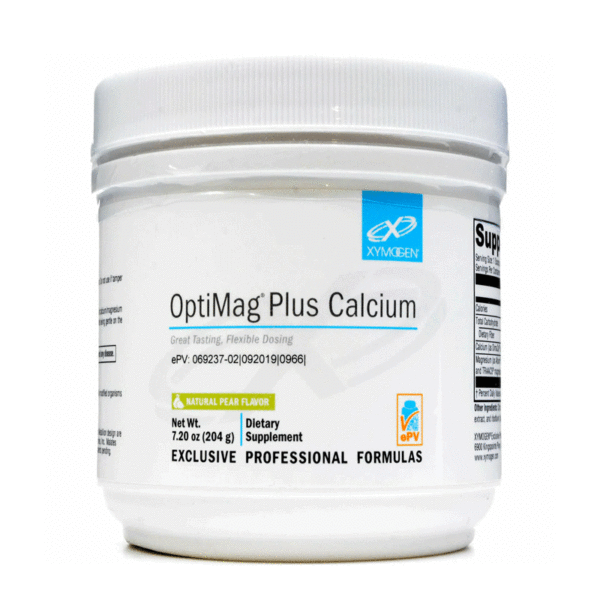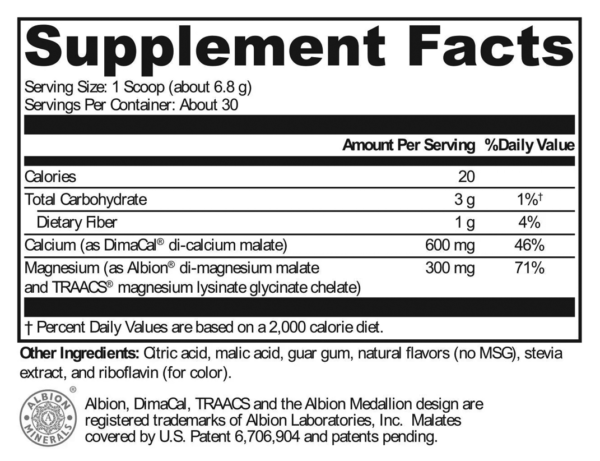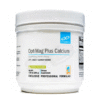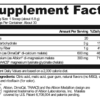OptiMag Plus Calcium (Net Wt. 7.20 oz) Natural Pear Flavor Powder
Product Highlights:
- Supports Neurologic Health*
- Supports Healthy Muscle Function/Healthy Nerve Conduction*
- Supports Calm Behaviors and Healthy Mood*
- Supports Bone Health*
- Supports Energy Production*
- Provides Magnesium and Calcium for Optimum Nutrition*
$25.99
Description
Description
OptiMag® Plus Calcium is a delicious, pear-flavored powdered supplement that provides high-quality, patented Albion® minerals in a state-of-the-art calcium/magnesium formulation. This supplement is easy to take for all ages, and the special forms of the minerals promote optimal absorption and utilization, while being gentle on the gastrointestinal tract.*
Magnesium
Magnesium, the fourth most abundant mineral in the body, participates in over 300 enzymatic reactions in nearly all tissues. Deficiency is common. The average American diet is thought to provide about 40% of the daily magnesium need, and reports from the World Health Organization have suggested that three quarters of American diets fall short of this amount.[1] Deficiency can result from poor dietary intake, poor absorption, and excessive losses through urine, stool, perspiration, or lactation. Because magnesium is predominantly an intracellular cation, serum magnesium levels remain a poor predictor of tissue magnesium content and availability.[1] Particular drugs, certain herbs, poor kidney function, excessive alcohol intake, and drinking mostly “soft” water can contribute to magnesium depletion.[1,2] It is also important to note that physical and emotional stress can increase the need for magnesium and that hypomagnesemia and
stress potentiate each other’s negative effects.[3,4] Furthermore, the adrenergic effects of psychological stress cause movement of magnesium from intracellular to extracellular space, which increases urinary excretion and depletion of body stores.*[4,5]
Magnesium participates in the development and maintenance of bones and teeth; the metabolism of carbohydrates, blood glucose, fats, and proteins; the formation of cells and tissues; the modulation of cytokines; and the maintenance of muscle function.[1,6,7] In addition, magnesium is often used to support normal, healthy bowel movements. Of particular interest are the associations between levels of magnesium and neurological health, behavior, and brain function.*[8]
Magnesium and Neurological Health
Magnesium is an integral part of nervous system function—from biosynthesis of neurotransmitters to neurotransmission. Magnesium affects permeability of excitable membranes and thereby acts as a “gatekeeper” to excitatory neurotransmitters (e.g., glutamate).[1] According to researchers, the most common clinical manifestations of magnesium deficiency are produced by neural and neuromuscular hyperexcitability.[2,5] Animal and human studies suggest that magnesium supports relaxation, successful sleep, comfort with surroundings and situations, attentiveness, and a healthy mood.[1,9-12] Low intracellular magnesium is associated with increased defensive behaviors in animals.[12] As an example, mice with low magnesium erythrocyte levels displayed restless and aggressive behaviors when under stress.[12,13] Several animal studies show the positive impact of magnesium administration on stress-related behaviors.[12] Low levels of magnesium have been observed in children who have difficulty focusing and magnesium supplementation
has been observed to influence attention behavior positively.[8,11,14] In Magnesium in the Central Nervous System, the authors state that high doses of magnesium are associated with “decreased physical aggression and improved social responsiveness” in children.[4]
Magnesium Quality and Absorbability
Magnesium lysinate glycinate comprises magnesium bound to two amino acids to create a chelate that is more readily absorbed through the mucosa than other mineral forms. Since the body can efficiently absorb dipeptides (two amino acids linked together), Albion’s TRAACS® magnesium lysinate glycinate is an excellent delivery system for magnesium.*
Di-magnesium malate consists of magnesium complexed in a 2:1 ratio of magnesium to malic acid. As a naturally occurring organic compound, malic acid is found in apples, watermelon, plums, lychees, and cherries in high concentration. It is more soluble than citric acid, and it forms mineral complexes.[15] Magnesium and malate play critical roles in the Krebs and glyoxylate energy producing cycles.[16] Malic acid also appears to exert a protective effect by binding aluminum.*[17]
Calcium
During childhood and adolescence, the body uses calcium to build strong bones. Calcium is required for vascular contraction and vasodilation and intracellular signaling and hormonal secretion. It also plays an important part in making sure that muscles and nerves work properly. Children and adults that adhere to a dairy free diet are often at greater risk of an insufficient intake of calcium.*[18]
OptiMag Plus Calcium provides 600 mg of elemental calcium as DimaCal in every scoop. Many calcium forms have low elemental calcium content when compared to DimaCal, which is 29% elemental calcium and 64% malic acid. Additional factors such as bioavailability and gastric tolerance should be evaluated when comparing DimaCal to calcium carbonate. Unlike calcium carbonate and other alkali forms of calcium, DimaCal does not cause the formation of gas when subjected to stomach acid. With malic acid acting as a natural buffering agent,
DimaCal does not give rise to the acid rebound that can result from the use of other forms of calcium.*[16]
DOES NOT CONTAIN: Wheat, gluten, yeast, soy, animal or dairy products, fish, shellfish, peanuts, tree nuts, egg, ingredients derived from genetically modified organisms (GMOs), artificial colors, artificial sweeteners, or artificial preservatives.
STORAGE: Keep closed in a cool, dry place out of reach of children.
*These statements have not been evaluated by the Food and Drug Administration. This product is not intended to diagnose, treat, cure, or prevent any disease.
References
1. Long S, Romani AM. Role of cellular magnesium in human diseases. Austin J
Nutr Food Sci. 2014 Nov 18;2(10). [PMID: 25839058]
2. Swaminathan R. Magnesium metabolism and its disorders. Clin Biochem Rev.
2003 May;24(2):47-66. [PMID: 18568054]
3. Seelig MS. Consequences of magnesium deficiency on the enhancement of
stress reactions; preventive and therapeutic implications (a review). J Am Coll
Nutr. 1994 Oct;13(5):429-46. [PMID: 7836621]
4. Vink R, Nechifor M, eds. Magnesium in the Central Nervous System. Adelaide,
South Australia: University of Adelaide Press;2011.
5. Galland L. Magnesium, stress and neuropsychiatric disorders. Magnes Trace
Elem. 1991-1992;10(2-4):287-301. [PMID: 1844561]
6. Nielsen FH. Effects of magnesium depletion on inflammation in chronic disease.
Curr Opin Clin Nutr Metab Care. 2014 Nov;17(6):525-30. [PMID: 25023192]
7. Kramer JH, Spurney C, Iantorno M, et al. Neurogenic inflammation and cardiac
dysfunction due to hypomagnesemia. Am J Med Sci. 2009 Jul;338(1):22-27.
[PMID: 19593099]
8. Magnesium. Somerville, MA: Natural Medicines. https://naturalmedicines.
therapeuticresearch.com/databases/food,-herbs-supplements/professional.
aspx?productid=998. Updated February 24, 2016. Accessed June 22, 2016.
9. Eby GA, Eby KL. Rapid recovery from major depression using magnesium
treatment. Med Hypotheses. 2006;67(2):362-70. [PMID: 16542786]
10. Jacka FN, Overland S, Stewart R, et al. Association between magnesium intake
and depression and anxiety in community-dwelling adults: the Hordaland Health
Study. Aust N Z J Psychiatry. 2009 Jan;43(1):45-52. [PMID: 19085527]
11. Kozielec T, Starobrat-Hermelin B. Assessment of magnesium levels in children
with attention deficit hyperactivity disorder (ADHD). Magnes Res. 1997
Jun;10(2):143-48. [PMID: 9368235]
12. Henrotte JG, Franck G, Santarromana M, et al. Mice selected for low and high
blood magnesium levels: a new model for stress studies. Physiol Behav. 1997
May;61(5):653-58. [PMID: 9145932]
13. Szewczyk B, Poleszak E, Sowa-Kućma M, et al. Antidepressant activity of zinc
and magnesium in view of the current hypotheses of antidepressant action.
Pharmacol Rep. 2008 Sep-Oct;60(5):588-89. [PMID: 19066406]
14. Starobrat-Hermelin B, Kozielec T. The effects of magnesium physiological
supplementation on hyperactivity in children with attention deficit hyperactivity
disorder (ADHD). Positive response to magnesium oral loading test. Magnes
Res.1997 Jun;10(2):149-56. [PMID: 9368236]
15. Schell J. Interdependence of pH, malate concentration, and calcium and
magnesium concentrations in the xylem sap of beech roots. Tree Physiol. 1997
Jul;17(7):479-83. [PMID: 14759841]
16. DimaCal. Albion Minerals. http://www.albionminerals.com/calcium/dimacal.
Accessed June 22, 2016.
17. Suzuki T, Tamura S, Nakanishi H, et al. Reduction of aluminum toxicity by
2-isopropylmalic acid in the budding yeast Saccharomyces cerevisiae. Biol
Trace Elem Res. 2007 Winter;120(1-3):257-63. [PMID: 17916978]
18. Calcium. National Institutes of Health, Office of Dietary Supplements. https://
ods.od.nih.gov/factsheets/Calcium-HealthProfessional/. Updated June 01, 2016.
Accessed June 22, 2016.




